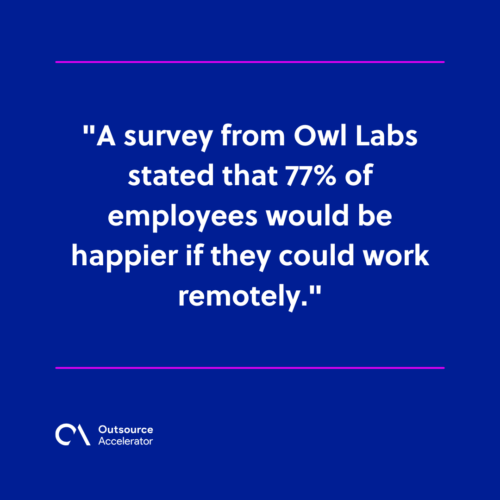10 Key benefits of teleworking

Since the pandemic, remote work and teleworking have been steadily increasing as more companies continue to adapt to this setup.
However, this concept is nothing new, and has been around even before the 2020s. There are many reasons why this work setup has been around for a long time, as it offers several benefits to businesses and employees alike.
Teleworking is a key concept in enabling remote staff to offer their services from offshore, such as those from Clark Staff.
What is teleworking?
Teleworking, also known as telecommuting, is when employers and employees work remotely without having to meet up in a physical office.
Employees can perform their responsibilities in any work-conducive environment as long as they remain in contact with their team.

10 benefits of teleworking for employers
Teleworking is not the same as a traditional office setup, but it offers many advantages that workers do not even think about reverting back to the office.
1. Flexible working hours
One of the main benefits of teleworking is having flexible working hours. You have the flexibility to plan your day around which tasks must be accomplished immediately and which ones can be spaced out throughout the day or week.
Some companies allow employees to choose their own hours and work when it is most convenient for them.
Whether you choose to work from the usual 9-5 or from 7 AM to 3 PM, being able to choose your own working hours plays a huge factor in achieving work-life balance and getting things done early.
2. Less travel fatigue
Imagine how much time is saved going to and from the office thanks to teleworking, taking into consideration traffic and the distance from your house to the office.
Teleworking removes the hassle of having to travel every day as you can start working immediately when you wake up in the morning.
3. Increased productivity
Employers can enjoy increased productivity from their remote employees as they can manage their own tasks and time.
A study from The Society for Human Resource Management states that productivity is not affected when shifting to a remote setup. In fact, productivity even increased, with employees working an extra three hours a day.
4. Cost savings
One of the most common headaches that come with running an office is the additional costs that employers have to factor in, such as utilities, rent, and Wi-Fi.
Fortunately, employers can forget about all of that when working with remote teams, as everyone pays for their own expenses.
Plus, funds that would have gone to managing an office can now be used for other things, like running a marketing campaign or recruitment.
5. Reduced stress levels
Working remotely or from home can reduce stress levels as workers have the flexibility to rest and take breaks. They have the comfort of working in their own ideal environment, which contributes to their productivity levels.
Workers do not have stress about long travel hours or constantly being in the physical presence of their superiors or colleagues, allowing them to focus on the task at hand better.
6. Better work-life balance
Nowadays, work-life balance must be a priority for all companies, and teleworking helps make that possible in different ways.
Remote work allows you to spend more time with your family and engage in hobbies or activities outside of work. You even have access to personal belongings and spaces for rest.
Further, setting workplace boundaries has become easier as employees can easily detach themselves from work at the end of the day.
7. Utilized global talent
Remote companies can tap into the global market and hire talent from all over the world.
Since there is no more need for travel or relocating to the company’s home country, it opens the door for international employees who can offer a fresh new perspective to the business.
Communication with these people is easier, thanks to instant messaging apps and emails. Further, the difference in time zones allows work to be done even during off hours, increasing overall productivity.
8. Increased employee satisfaction
A survey from Owl Labs stated that 77% of employees would be happier if they could work remotely. After all, teleworking helps increase productivity levels, lower stress levels, and help employees achieve work-life balance.
Teleworking also makes it easier for employers to maintain communication with their employees. Rules and expectations are made clear and easy to follow, which increase overall satisfaction levels.

9. Healthier lifestyle
Having flexible hours and less travel time leads to healthier employees. Because of the nature of remote work, workers can save energy commuting and engage in healthy physical activities, such as sports, yoga, or running.
Additionally, they can manage their diet better as they have easier access to their personal food options, which is important for employees who have specific dietary needs.
10. Environmental benefits
Back then, workers would drive their car to and from the office, which not only adds to traffic, but to the carbon footprint left by other drivers and vehicles.
Taking a large chunk of cars away decreases the amount of harmful emissions, which is a small step to contributing to a cleaner and greener environment.
Taking advantage of the benefits of teleworking
Teleworking does wonders for a company and its employees. Switching to a fully remote setup is a big decision, so it is important to discuss it with your company beforehand.
However, if implemented properly, teleworking will have a significant, positive impact on both employers and employees, such that they will not want to return to a traditional office setup.







 Independent
Independent




